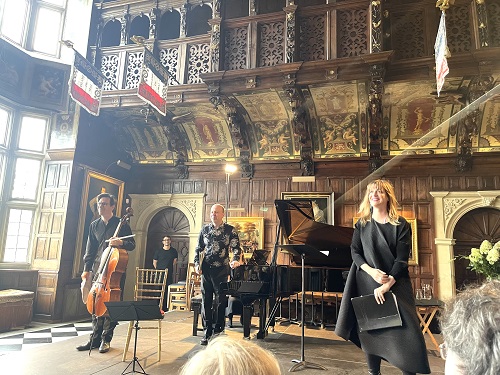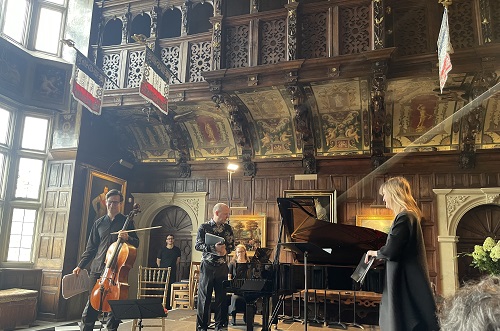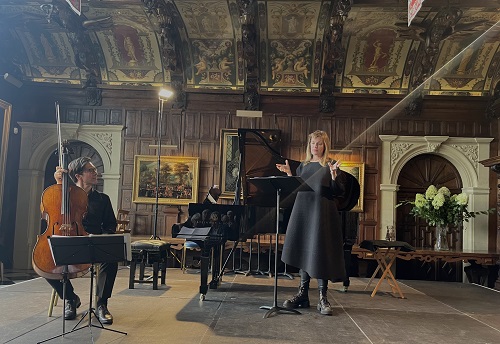The theme of this year’s Hatfield House Chamber Music Festival is ‘A Family Affair’. As Lord Salisbury and Artistic Director Guy Johnston explain in their introductions in the Festival programme, Hatfield House has been the home of the Salisbury family since it was built. The ensembles performing at the Festival have, over the years, often comprised family members – siblings, spouses – and friends; and in their collaborations, the ensembles have become part of the same musical family. The Festival audience, many of whom are ‘old friends’, belong to this community, too.
Soprano Ruby Hughes and pianist-composer Huw Watkins are frequent collaborators, most recently on their disc, Echo, the Wigmore Hall launch of which I reviewed last December. In this lunchtime recital, presented in the Marble Hall at Hatfield House, they were joined by cellist Guy Johnston. The musicians began with three chorales by Bach (Hughes seemed to forget the order in which they were to be performed, which was rather charming in that it only added to the sense of spontaneity that their music-making engendered). Hughes’ soprano is pure, her German diction good, and her attention to the text detailed: these qualities were all assets here. There are, I feel, inevitably issues of context which arise when these statements of religious belief, and doubt, are removed from their original religious environment. Add to that an ‘inauthentic’ (for want of a more apt term) accompaniment – a grand piano and a cello part which sometimes, as in Gedenke doch, mein Geist, zurücke (Be mindful, O soul), trod a pizzicato bass line, and at other times, as in Komm, süßer Tod (Come, sweet death), was more of an expressive countermelody – and the performers had to work hard to create an appropriately sacred air.

Hughes’ delivery – very intense, sometimes fading the voice to a whisper – occasionally seemed more ‘art song’ than ‘chorale’: the vocal enrichment of the reference to the ‘world’s oppressive burdens’ (“Bürde der Welt”) in Liebster Herr Jesu (Dearest Lord Jesus) was one such detail that was undoubtedly expressive but might feel anachronistic. At times I’d have liked a steadier melodic line, even if that meant forsaking some of the detail and nuance that Hughes projected. There were some lovely moments though, not least the blossoming of warmth, “Es ist nunmehr Vollbracht,/ Welt, darum gute Nacht” (All is now accomplished, Thus I bid you goodnight, O world”) at the close of Komm, süßer Tod and the sense of peace that Hughes made tangible in the final line of this chorale: “Komm, sel’ge Ruh!”
In between the chorales, Huw Watkins performed two sarabandes by Bach, which were characterised by a gentle, evenly progressing bass line, eloquence of melody, transparency of texture and counterpoint, delicacy of ornament – especially the well-placed, leaning appoggiaturas – and a strong sense of the building through the overall architecture. These miniatures were both precious and contained whole worlds.
Hughes seemed more comfortable in the Romantic repertoire which followed. Her soprano relaxed and blossomed, without any loss of nuance, and there was a better balance between the three performers. Brahms’s Two Songs for Voice, Viola and Piano Op.91 (1884) were composed for Joseph Joachim and his wife Amalie. Here the viola part was transcribed for cello (I’m not sure if the songs were also transposed, for they lie quite low in the voice). ‘Gestillte Sehnsucht’ (Assuaged longing) alternated stillness and sudden tumult, as desires stirred, “Im Herzen sonder Rast und Ruh!” (In my heart without respite). Hughes captured the questioning mood, slowing and easing effectively to ponder, “Wann ruhest du, wann schlummerst du?” (When will you rest, when will you sleep?), and Johnston and Watkins created a sense of inner movement, restless yearnings that could not quite, whatever the title of the song, be assuaged. ‘Geistliches Wiegenlied’ (Sacred cradle-song) finds Brahms drawing on folk traditions. Hughes created a telling contrast between the urgency of the cry to the holy angels in the first stanza, “Stillet die Wipfel!” (Silence the tree-tops!), and the final, less anxious reminder at the close – for, now, “Es schlummert mein Kind” (My child is sleeping).

At the start of Schubert’s ‘Auf dem Strom’, Watkins’ flowing river currents conjured a relaxed air, as farewell kisses were exchanged and the boat departed from the shore, but Hughes immediately injected a note of anxiety, underpinned by the piano’s rapid, tense repeated notes. Wildly fluctuating moods characterised this performance, capturing the song’s quasi-operatic quality. Even when a sense of charm and wonder was experienced, as in the third stanza when the poet speaks of the ‘mysterious ties’ that draw him to a ‘yonder arbour’, the mood was never allowed to settle, the river always rushing him along, unstoppable, alarming. Johnston played with suppleness and warmth, his cello lacking none of the Romantic power of the original horn obbligato. His eloquent solo introduced the final verse in which Hughes’ soprano acquired the ‘gentle radiance’ (“milden Scheine”) of the stars alluded to in Rellstab’s poem, growing in rapture at the thought of the union to come in the sacred heavens, “Dort vielleicht, o tröstend Gluck!/ Dort begegn’ ich ihrem Blick” (There, perhaps, O consoling fate, there I shall meet her gaze).
One of my favourite works by Schubert, Der Hirt auf dem Felsen (The Shepherd on the Rock), followed, Johnson again playing a transcription, this time of the original obbligato for clarinet. The musicians conveyed the pictorial elements of the song persuasively: the echo from the ravines, “Schwingt sich empor der Widerhall”, truly glowed and quivered. The storytelling was aided by smooth elisions between the varying time signatures, keys and moods. In the minor-key episode, when the poet-speaker is consumed by loneliness and grief, the piano’s sad rocking figure underpinned Hughes’ well-shaped extended phrases, and the eventual return to the major tonality was uplifting – “Die Herzen es zum Himmel zieht/ Mit wunderbarer Macht” (That is draws hearts to heaven/ With wondrous power) – the repetition of the text emphasising the sense of marvel. The musicians built an almost fierce energy towards the close, creating exciting dramatic impetus, as the yearning shepherd, sitting high on his rocky promontory, imagines the springtime that will bring about his reunion with his beloved.
The three miniatures that form Schumann’s Fantasiestücke Op.73 were a fitting postlude to the two dramatic songs by Schubert, full as they are of drama and imagination, and also very ‘vocal’ in character. Everything about the opening movement was fluid and organic, Johnston’s expressive lines tenderly coaxed, all the small sighs and ‘double takes’ subtly but vividly rendered, with a lovely golden tone. Watkins supported the cello’s freedom – Johnston’s bowing was brilliantly relaxed and silky – and the pair’s well-judged rubatos and insightful response to the harmonic twists and turns were compelling. The second movement was a treasure trove of colours, almost impressionistic at times, always light – the duo created a lovely liquidity. And, then, a mischievous conclusion of almost cheeky exuberance, with the rhythmic complexities of the partnership perfectly coordinated: a brilliant synthesis of lyricism and virtuosity.

The simplicity and directness of John Tavener’s Akhmatova Songs, three of which were performed here, presented a striking contrast to Schumann’s fantasies, and perfectly showcased Hughes’ sensitivity to text and fusion of word and colour. Originally composed for Patricia Rozario and Steven Isserlis, the songs are austere yet touching and communicative. Placing ‘Dante’ (the first song) and ‘Boris Pasternak’ (the third) side by side highlighted the parallel between the persecution suffered by the Florentine thinker and writer and that experienced in Akhmatova’s own time, as she and Pasternak refused to submit to Stalinist oppression – and, by implication, the persecution of artists everywhere that continues today.
Climbing high on the cello’s A string, at the start of ‘Dante’ Johnston introduced the Eastern Orthodox-inflected melody that settles on a single pitch to which the voice is then repeatedly drawn. Hughes’ delivery of the stark poetic images was authoritative. Tavener challenges the voice, and Hughes, singing in Russian, was equal to the ferocity of the outburst at the close at the song, and the subsequent plunge to alto depths, as the poet denounces the city he would not betray, “Perfidious, base, self-deserted”. The brief ‘Boris Pasternak’ was more ‘innocent’, becalmed by the cello’s poised opening thread of melody. In ‘Couplet’, an angry, low cello accent and trill introduced Hughes’ quasi-spoken opening line, a contemptuous rejection of the praise which is “like ashes”, before the voice climbed tentatively, fading, perhaps reflecting the dissipation of the artist’s own ego, the assimilation of their soul with a higher spiritual agency. Concluding the sequence, Tavener’s Chant for solo cello was a meditative stream of continuous melody, muted, perfectly pitched, ethereal – Johnston’s fluid bowing conjuring an almost human vocalise.
The recital concluded with Berlioz’s La Captive Op.12, in which Hughes, anchored by the piano’s chords and gentle rocking, proved herself a powerful storyteller as she mined the expressiveness of Victor Hugo’s sometimes discursive imagery with sensitivity. The captive girl’s reminiscences of her balmy, verdant homeland were particularly affecting, her closing vision a fusion of reality and the imagination as she dreams of the expanse of moonlight spreading its “silver fan” across the ocean. It was a magical end to a generous and varied programme, which traversed a wide emotional and expressive gamut.
Claire Seymour
Ruby Hughes (soprano), Guy Johnston (cello), Huw Watkins (piano)
Bach – Gedenke doch, mein Geist, zurücke, Komm, süßer Tod, Liebster Herr Jesu, sarabandes in B Minor and D;Brahms – ‘Gestillte Sehnsucht’, ‘Geistliches Wiegenlied’; Schubert – ‘Auf dem Strom’, Der Hirt auf dem Felsen; Schumann – Fantasiestücke Op.73; Tavener – ‘Dante’, ‘Boris Pasternak’, ‘Couplet’ (from Akhmatova Songs), Chant for solo cello; Berlioz – The Captive Op.12.
The Marble Hall, Hatfield House, Hertfordshire; Saturday 30th September 2023.
ABOVE: Guy Johnston and Ruby Hughes (photo credit: Nicky Thomas)